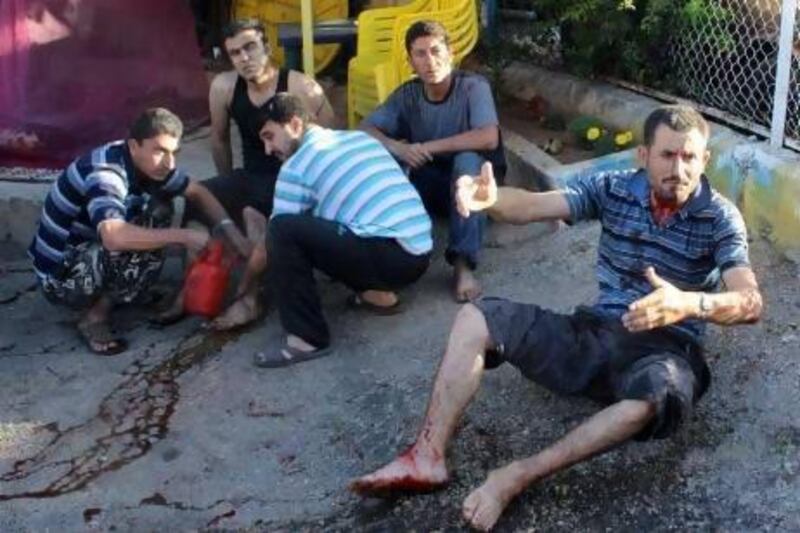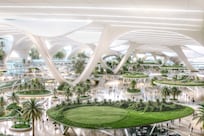ISTANBUL // Two rockets hit Hizbollah's stronghold in southern Beirut yesterday, marking a dangerous new phase in Syria's civil war.
The attack on the Beirut suburb of Chiyah was limited in scale - four Syrian labourers were wounded and some windows were smashed - but its implications could be far reaching.
It was the first time the Hizbollah-dominated area has been attacked, sparking fears that a new front in the Syrian war is opening in the Lebanese capital.
The Free Syrian Army, the umbrella group representing some rebel forces, denied any role, but one FSA officer described the attack as a warning to Hizbollah.
"In coming days we will do more than this. This is a warning to Hizbollah and the Lebanese government to keep Hizbollah's hands off Syria," Ammar Al Wawi said.
Some Syrian rebels have said the war would soon arrive on Hizbollah's home turf if the group continued to fight alongside Bashar Al Assad's forces inside Syria. That pledge seems to have been borne out.
The rockets were fired less than 24 hours after Hizbollah's leader, Hassan Nasrallah, delivered an apocalyptic warning that his forces were engaged in an "existential war" and that thousands of his loyalists were prepared to die in pursuit of victory.
"We will continue to the end of the road, we accept this responsibility and will accept all sacrifices and expected consequences of this position," he said.
The rockets fired into Chiyah were presumably part of those expected consequences. So too must be the increasing number of Hizbollah fighters being killed in Qusayr, near the Syrian-Lebanese border.
News reports suggested another 22 Shiite militants were killed in fierce fighting there on Saturday, adding to the spiralling death toll on both sides.
Qusayr, an otherwise unremarkable small Syrian town about 10 kilometres from the frontier with Lebanon, has become the focal point of a strategically and symbolically important battle between the regime and the rebels.
The war is, however, frighteningly larger than that.
Alongside Mr Al Assad stand Hizbollah and Iran - the self-styled "resistance bloc" - and Russia. All are powerful allies providing the Syrian government with the advanced weapons, money, fighters and diplomatic cover it needs to sustain a war that has already killed upwards of 94,000 people.
Syria's rebels are similarly, if less unconditionally or lucratively, supported by outside powers. Foreign Islamist fighters have flocked to their cause, Saudi Arabic, Qatar and Turkey have ensured a limited flow of cash and guns reach their hands, and the US and EU are - hesitantly and partially - backing them on the world stage.
The Syrian uprising started in March 2011 with a small group of young men and women peacefully demanding more political rights in a stifling family-run autocracy.
It morphed into a civil war when the regime's violence against those early protesters provoked a violent response.
That civil war is no longer, if it ever was, merely a matter for Syrians alone to determine. Regional and world powers are increasingly, irrevocably tangled up in the destructive, bloody mess.
And an alarming sectarian undertone, whispered at first, now shouted, has risen increasingly to the forefront, pitting Sunni against Shiite.
Most of the rebels in Syria are Sunnis, so too are their backers. Reglious militancy in the powerful and Al Qaeda-linked Jabhat Al Nusra, and other rebel factions, is prominent.
On the other side, the Syrian regime has, for more than 40 years of rule, been dominated by Alawites, a Shiite sect. Its supporters, Hizbollah and the Iranian theocracy, are militant Shiites.
It is difficult to determine exactly how large this sectarian dimension is but there is little question it is growing, and it is highly dangerous for a region that, in Lebanon and Iraq, has known appalling confessional wars in recent years.
Syria is now a playground for layer upon layer of interwoven conflicts. Shiite versus Sunni, secular versus religious, Iran versus the Arab Gulf states, Israel versus its enemies, the US versus Russia - to name some.
Inside Syria it is neighbour versus neighbour, sometimes brother against brother, daughter against father.
Yesterday 12 people were killed in fighting between Syrian rebels and Kurdish factions in north-eastern Syria, yet another dimension of a complex, worsening conflict.
A lurch towards regional war has been aided and abetted by persistent divisions within the opposition Syrian National Coalition, currently hovering on the brink of collapse in Istanbul.
It has been able to agree on the principle of trying to overthrow Mr Al Assad but little else, its members more occupied with power plays against one another than in uniting in pursuit of their common cause.
This week the European Council for Foreign Relations issued a report cautioning that a worsening conflict was in urgent need of de-escalation, something requiring difficult compromises and "a grand regional bargain".
"The real choice is now between two unsavoury paths: a full-scale intervention and a commitment to real diplomacy," the report said, urging the latter.
Yesterday's rocket strikes in Beirut, and the Hizbollah leader's speech, took the region further away from a peaceful solution.
Just over 18 months ago Mr Al Assad predicted a regional war, "an earthquake", if attempts to overthrow his regime continued.
With the tremors of recent days that forecast - or threat - seems ever more prescient.
twitter: For breaking news from the Gulf, the Middle East and around the globe follow The National World. Follow us





